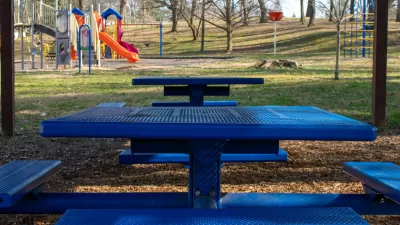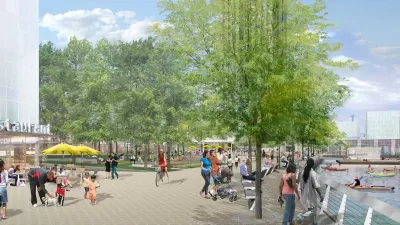Philadelphia spends $64 on parks and recreation facilities per resident, one of the lowest totals in the nation. Ryan Briggs uses the city as a lens to examine the growing impact of budget cuts to park systems on their surrounding communities.
After hundreds of residents campaigned for a year, the Philadelphia City Council approved a $2.67 million increase in funding for its Department of Parks and Recreation last November. "The funding increase is still far less than the additional $17 million a year that Mayor Michael Nutter said, while campaigning for his current office in 2007, was required for basic maintenance of the city’s park system alone," says Briggs; but as Lauren Bornfriend, director of the Philadelphia Parks Alliance said, it's "a start."
The problem, continues Briggs, is that "[e]veryone loves the idea of parks and rec centers, but no one likes actually paying for them. Parks and Recreation services have long been whipping boys of city councils and municipal budget-makers across the country, with funding cuts being less politically charged than those to emergency services and less immediately noticeable than, say, libraries. With long-standing national and global economic uncertainty eating into municipal revenues, cuts to park budgets have become more frequent and pronounced." The lack of funding results in decay that disproportionately affects lower-income neighborhoods and decreases the health of surrounding communities.
The Rec Department proposes that "maintenance costs to existing parkland and rec centers can be partially deferred by institutionalizing the process of organizing so-called 'Friends' groups for recreation facilities across the city," says Briggs, but "such organizations are far more likely to appear in well-to-do areas, where there are more private dollars floating around to make up the difference." Deputy Mayor of Environmental and Community Resources Michael DiBerardinis "believes the Rec Department can help set up additional groups in neighborhoods that are rich in volunteers but short on cash."
Whatever the solution, or combination of them, it's clear that in lean budgetary times, "citizen activism is crucial to securing equitable funding for parks."
FULL STORY: Everyone Loves Parks, But No One Wants to Pay For Them

Planetizen Federal Action Tracker
A weekly monitor of how Trump’s orders and actions are impacting planners and planning in America.

Maui's Vacation Rental Debate Turns Ugly
Verbal attacks, misinformation campaigns and fistfights plague a high-stakes debate to convert thousands of vacation rentals into long-term housing.

San Francisco Suspends Traffic Calming Amidst Record Deaths
Citing “a challenging fiscal landscape,” the city will cease the program on the heels of 42 traffic deaths, including 24 pedestrians.

Defunct Pittsburgh Power Plant to Become Residential Tower
A decommissioned steam heat plant will be redeveloped into almost 100 affordable housing units.

Trump Prompts Restructuring of Transportation Research Board in “Unprecedented Overreach”
The TRB has eliminated more than half of its committees including those focused on climate, equity, and cities.

Amtrak Rolls Out New Orleans to Alabama “Mardi Gras” Train
The new service will operate morning and evening departures between Mobile and New Orleans.
Urban Design for Planners 1: Software Tools
This six-course series explores essential urban design concepts using open source software and equips planners with the tools they need to participate fully in the urban design process.
Planning for Universal Design
Learn the tools for implementing Universal Design in planning regulations.
Heyer Gruel & Associates PA
JM Goldson LLC
Custer County Colorado
City of Camden Redevelopment Agency
City of Astoria
Transportation Research & Education Center (TREC) at Portland State University
Jefferson Parish Government
Camden Redevelopment Agency
City of Claremont





























